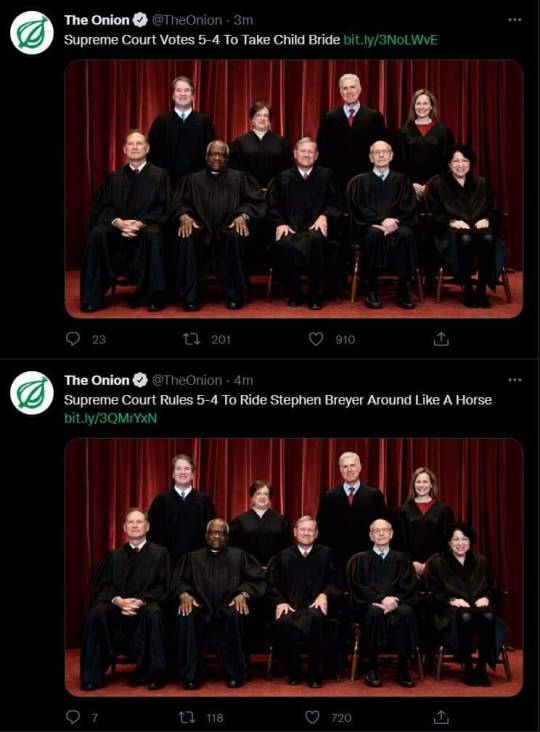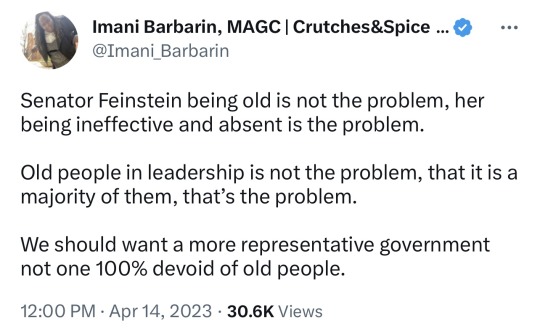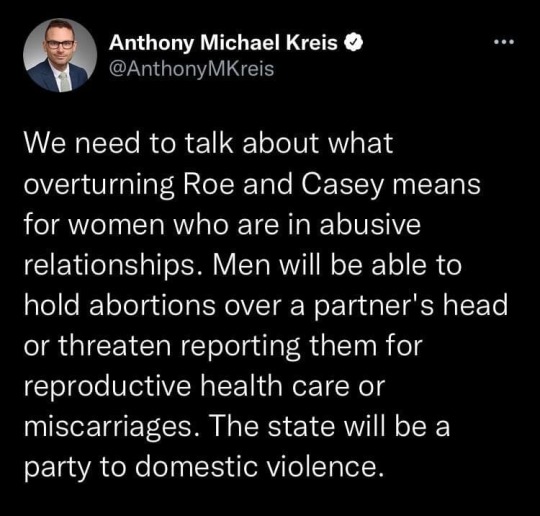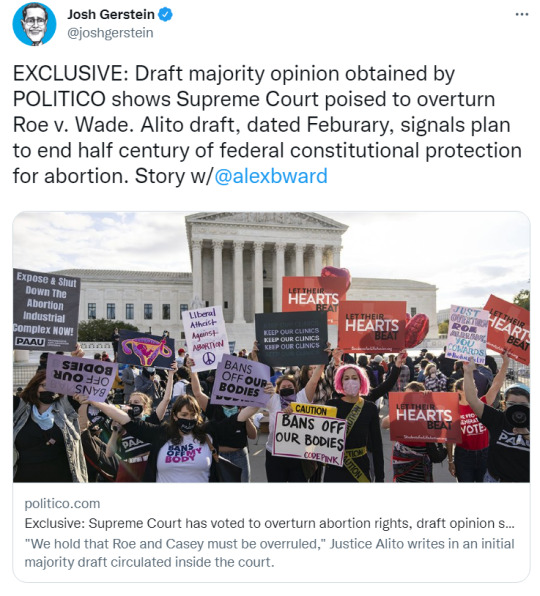#justice stephen breyer
Text





#us politics#the onion#us supreme court#scotus#news#fuck republicans#justice stephen breyer#justice brett kavanaugh#justice clarence thomas#justice amy coney barrett#justice antonin scalia#justice sonia soromayor#justice elena kagan#justice neil gorsuch#chief justice john roberts#justice john roberts#scotus be like
150 notes
·
View notes
Text
Justice Stephen Breyer has notified the White House that his retirement will be effective Thursday, June 30, at noon ET.
In a letter to President Joe Biden, Breyer said it had been his "great honor" to participate as a Judge in the "effort to maintain our Constitution and the Rule of Law."
He said that Judge Ketanji Brown Jackson is prepared to "take the prescribed oaths" to begin her service as the 116th member of the court.
The fact that the court will issue final opinions and orders on the same day reflects a more expedited timeline than past terms. It suggests that the justices -- who have been subject to death threats since the release of a draft opinion overturning Roe v. Wade are eager for the momentous and divisive term to end as soon as possible.
There are two big cases awaiting resolution concerning the environment and immigration.
Breyer, who was appointed to the court in 1994 by then-President Bill Clinton, announced his retirement plans in January. The highly anticipated decision was met with a collective sigh of relief by Democrats, who feared the possibility of losing the seat to a future Republican President should the 83-year-old jurist ignore an intense pressure campaign from the left, which urged him to leave the court while Biden had a clear path to replace him.
A consistent liberal vote on the Supreme Court with an unflappable belief in the US system of government and a pragmatic view of the law, Breyer has sought to focus the law on how it could work for the average citizen. He was no firebrand and was quick to say that the Supreme Court couldn't solve all of society's problems. He often stressed that the court shouldn't be seen as part of the political branches but recognized that certain opinions could be unpopular.
In his later years on the court, he was best known for a dissent he wrote in 2015 in a case concerning execution by lethal injection. He took the opportunity to write separately and suggest to the court that it take up the constitutionality of the death penalty.
In the opinion, Breyer wrote that after spending many years on the court reviewing countless death penalty cases, he had come to question whether innocent people had been executed. He also feared that the penalty was being applied arbitrarily across the country. He noted that, in some cases, death row inmates could spend years -- sometimes in solitary confinement -- waiting for their executions.
Jackson, Breyer's replacement, was confirmed by the Senate in April by a vote of 53-47, with three Republicans joining Democrats to vote in favor. Though her addition to the bench doesn't change the ideological balance of the court, Jackson will be the first Black woman to serve on the highest court in the nation.
#us politics#news#justice stephen breyer#justice ketanji brown jackson#us supreme court#scotus#biden administration#president joe biden#2022#roe v. wade#president bill clinton#cnn#death penalty
84 notes
·
View notes
Text

#us politics#news#politico#us supreme court#scotus#roe v wade#Justice Samuel Alito#planned parenthood#Planned Parenthood v. Casey#justice clarence thomas#justice neil gorsuch#justice brett kavanaugh#justice amy coney barrett#justice stephen breyer#justice Sonia Sotomayor#justice Elena Kagan#Dobbs v. Jackson Women’s Health Organization#us constitution#Justice Ruth Bader Ginsburg#laurence tribe#14th amendment#us history#2022#biden administration#abortion is better than negligence#abortion is a human right#abortion is a right#abortion is not a crime#abortions#abortion bans
4 notes
·
View notes
Text
Ketanji Brown Jackson Officially Sworn in to Serve as Justice on U.S. Supreme Court
Ketanji Brown Jackson Officially Sworn in to Serve as Justice on U.S. Supreme Court
According to the New York Times, just after noon today, Ketanji Brown Jackson took the judicial oath, becoming the first Black woman to serve on the United States Supreme Court.
Justice Jackson, 51, was confirmed in April, when the Senate voted 53 to 47 on her nomination. She has replaced Justice Stephen Breyer, 83, who she once clerked for. Breyer stepped down at the conclusion of the court’s…

View On WordPress
#Chief Justice John Roberts#Justice Breyer#Justice Stephen Breyer#Ketanji Brown Jackson#Patrick G. Jackson#United States Supreme Court
16 notes
·
View notes
Text
Ketanji Brown Jackson sworn in as Supreme Court justice
Ketanji Brown Jackson sworn in as Supreme Court justice
Ketanji Brown Jackson sworn in as Supreme Court justice

View On WordPress
0 notes
Text
What's Going On With Roe v Wade (5/3/2022 - 2:45am EDT)
On the night of 5/2/2022, Politico released a leaked draft abortion opinion written by Justice Samuel Alito, a conservative justice on the Supreme Court, that would overturn Roe v. Wade--this was a majority opinion, meaning that, in a preliminary vote, at least 5 justices had voted for it.
What this means:
A majority of the Supreme Court (at least 5 of the 9 members) are currently voting on the side of overturning Roe v. Wade. Given that the conservatives have a super-majority (6 members) on the court, this is not a huge surprise. Justice Stephen Breyer is the one who will be voting on this, not Ketanji Jackson Brown. This will make no difference in the vote--they are both liberal votes.
If the result of this vote holds, Roe will be overturned. The New York Times covers what the end of Roe would mean (likely behind a paywall, you can likely get around that by using Incognito mode).
Someone leaked this opinion. That is very small compared to the massive impact of Roe potentially being overturned, but in the history of the Court it is a huge deal. Whoever did this is incredibly brave and will most likely lose their job and their career from this.
What this doesn't mean:
That the Supreme Court has released a decision. June is the last month of the Supreme Court's term, and it's when they release a lot of their decisions, especially the major ones. This was a leaked draft opinion.
That Roe has been overturned. Again, no decision has been released, and the vote is not final.
That this means that abortion will become illegal nationwide. You can look at the NYT explanation above, but in summary, there are 13 states with "trigger laws" which will make abortion illegal if/when Roe is overturned, and there is an estimate of somewhere between 24 and 26 states that will ban abortion if Roe is overturned.
That the majority of the country wants this. Based on basically every recent poll I can find, the majority of the country opposes overturning Roe, including many Republicans.
What's happening now:
The Women's March is calling for nationwide protests on 5/3/2022 at 5pm local time. (not sure if there's alt text on the image, but the tweet it's replying to links to the details)
As of 1:30am EDT people had gathered outside of the Supreme Court. Barricades have been up in front of the Court since a scientist self-immolated in front of the Court on 4/24/2022 to bring attention to climate change.
House Speaker Nancy Pelosi (D-CA) and Senate Majority Leader Chuck Shumer (D-NY) put out a statement condemning the draft opinion.
There will almost certainly be a huge amount of movement on this in the next few days and weeks, including a resources on what you can do to help support reproductive rights in the United States.
Some resources:
New York Times: Live reporting
Women's March: Info on 5/3/2022 protests
Planned Parenthood
2K notes
·
View notes
Text
BOTH PARTIES ARE THE SAME!!!, SCOTUS edition:
Clarence Thomas: appointed by George H.W. Bush (Republican)
Samuel Alito and John Roberts: appointed by George W. Bush (Republican)
Neil Gorsuch, Brett Kavanaugh, Amy Coney Barrett: appointed by Donald Trump (Republican)
Conservative total: 6
Sonia Sotomayor and Elena Kagan: appointed by Barack Obama (Democrat)
Ketanji Brown Jackson: appointed by Joe Biden (Democrat) replacing Stephen Breyer, appointed by Bill Clinton (Democrat), who also appointed Ruth Bader Ginsburg;
Liberal total: 3
Most common split on all these bad decisions: 6-3
Gee, it's almost like SCOTUS actually is incredibly important, Hillary Clinton and the entire mainstream Democratic electorate knew that in 2016, Democratic presidents consistently appoint the justices who are on the side of the rulings that you agree with, it was maybe a bad idea to let a man charged with 71 felony counts including criminal espionage appoint one-third of the current court, and yet BUH BUH BERNIE AND HER EMAILS.
#hilary for ts#politics for ts#hillary clinton was right about everything: the redux redux redux#i will never not once ever not be salty about this#and how the purity brigade and decades of GOP bile aimed at hillary#have gotten us to exactly this point that all of us with brains in our heads saw coming back in 2016#urrrrrrgh
205 notes
·
View notes
Text



And right on schedule, Mitch McConnell has returned to block the now-deadlocked Judicial committee from selecting a replacement for the ailing Feinstein. So Democrats are now successfully blocked from appointing any of Biden’s judicial nominees to the bench. Feinstein stepping down and allowing California’s Democratic governor, Gavin Newsom, to name her replacement is one easy way to end this Republican farce, but she won’t do what’s best for her constituents. (source)
Feinstein has been missing in action for months now. Her absence is materially harming the nomination and appointment of judges—judges who could counter the radical zealots that Trump seated. If she cannot do the job any longer (and there is a lot more to be said on that front), then she needs to make room for someone else who can.
I understand that a lot of Blue MAGA sycophants do not like to read, see or hear anything even slightly negative about RBG, but the truth is that she had cancer and knew that her health was failing.
Despite two previous bouts with metastatic pancreatic cancer and public pleas from Democratic law scholars, she decided not to retire in 2013 or 2014 when Obama and a Democratic-controlled Senate could have appointed and confirmed her successor. Waiting until Hillary could replace her was a selfish and incredibly risky gambit, and in the end, she lost. Now everyone else is paying the price for her hubris.
Had to be said. Sorry.
I’m not necessarily his biggest fan, but at least Stephen Breyer understood that when a Supreme Court Justice decides to retire, and who will pick their replacement, is an important part of post-electoral politics.
Look, I’m a BIG believer in going hard and doing all the good you can, while you can. This goes doubly for people in positions of power, like politicians. Because guess what? Tomorrow is not promised to anyone.
This is another reason why I have such a problem with “pragmatism”… we won’t always win, but we must always fight for what is right. Settling for what you can get is one thing, but deliberately aiming low so as not to make waves or upset the conservative base is entirely different.
So IF you can get more good things™ done today, then you should go for it while the getting is still good. Time is a luxury and incrementalism favors the wealthy and powerful. Republican strategist Lee Atwater understood that stalling and delaying on a political outcome was just as good as winning the battle. Because stalling and delaying, with only minor cosmetic changes, maintains the status quo.
Democrats need to understand that “triangulating” and “pragmatically” waiting for a better time is precisely what Republicans want. It’s acquiescing.
I believe in what MLKjr called the fierce urgency of now, not the fierce urgency of pragmatically waiting for conservatives to decide on when would be a better time for progress.
It’s super easy to be “pragmatic” and wait just a bit longer when it’s not YOUR rights that are being denied and trampled on.
Anyway, Dianne Feinstein needs to retire. Now.
290 notes
·
View notes
Link
The majority opinion was discussed in detail last month when the draft was leaked. If you’d like to read the entire dissenting opinion from Stephen Breyer, Sonia Sotomayor, and Elena Kagan, here it is.
One thing to note is that several times they compare the majority opinion in this case to last week’s ruling that overturned a New York gun control law. They point out inconsistent legal reasoning in the majority’s rulings about regulating guns and regulating abortions and inconsistent use of precedent.
They also point out the many other precedents that are now in danger, and it is a longer list than what people are usually discussing:
Contraceptives for unmarried and married couples
Non-marital sex, whether homosexual or heterosexual
Marriage rights for same-sex couples, interracial couples, and prisoners
Right not to be forcibly sterilized
Right to live with relatives
Right to make decisions about your children’s education
And others
They describe these privacy and due process cases as all linked together and they describe the majority as trying to pull abortion rights out without collapsing the whole Jenga tower.
I’m separately posting a number of brief excerpts from the dissent.
656 notes
·
View notes
Text
7 notes
·
View notes
Text
For disability awareness month I'm gonna give y'all a run down of Cummings v Premier Rehab Keller
""The high court ruled {April 28, 2022} 6-3 against Jane Cummings, who is deaf and legally blind, determining that emotional distress from discrimination is insufficient harm to warrant a lawsuit under four federal civil rights laws.
Cummings sued after Premier Rehab Keller in Texas declined to provide her a sign language interpreter at her physical therapy appointments. The therapy provider said that Cummings could use notes, lip reading and gestures to communicate instead.
Cummings argued that Premier Rehab Keller discriminated against her on the basis of disability, violating the Rehabilitation Act of 1973 and the Affordable Care Act, which apply to facilities that receive federal funds like the therapy provider does."
In addition to the Rehabilitation Act and the Affordable Care Act, the ruling applies to the Title VI of the Civil Rights Act of 1964 and Title IX of the Education Amendments of 1972.
In dissent, Justice Stephen G. Breyer noted that discrimination often harms in ways that are purely emotional.
However, a federal judge determined that Cummings’ only injuries were “humiliation, frustration and emotional distress” and indicated that the laws in question did not allow for the recovery of damages in such cases. A federal appeals court affirmed the ruling and a majority of the Supreme Court agreed."
source
What are the rights affected, exactly?
Rehabilitation Act of 1973:
requires affirmative action in employment by the federal government and by government contractors and prohibits discrimination on the basis of disability in programs conducted by federal agencies, in programs receiving federal financial assistance, in federal employment, and in the employment practices of federal contractors
The Affordable Care Act:
To provide essential health benefits as ambulatory patient services; emergency services; hospitalization; maternity and newborn care; mental health and substance use disorder services, including behavioral health treatment; prescription drugs; rehabilitative and habilitative services and devices; laboratory services; preventive and wellness services and chronic disease management; and pediatric services, including oral and vision care
Title IX of the Education Amendments of 1972:
requires that no person be excluded from participation in, denied the benefits of, or subjected to discrimination on the basis of sex under “any education program or activity receiving Federal financial assistance.”
Title VI of the Civil Rights Act of 1964:
prohibits discrimination on the basis of race, color, or national origin in any program or activity that receives Federal funds or other Federal financial assistance.
What does that mean?
Lack to provide equal accessibility is no longer ableism under federal law and
Intentional inaccessibility discrimination is okay so long as there is no material or physical affect
#disability awareness month#disability rights#accessibility rights#discrimination rights#human rights#supreme court#cummings v premier rehab keller#ableism#racism#homophobia#transphobia#medical discrimination#xenophobia#sexism#misogyny#feminism#classism#religious prejudice#lgbt rights#trans rights#racial equality#age discrimination#gender discrimination#native rights#ndn#mutual aid#roe v wade#joe biden#current events
156 notes
·
View notes
Text
The Supreme Court has voted to strike down the landmark Roe v. Wade decision, according to an initial draft majority opinion written by Justice Samuel Alito circulated inside the court and obtained by POLITICO.
The draft opinion is a full-throated, unflinching repudiation of the 1973 decision which guaranteed federal constitutional protections of abortion rights and a subsequent 1992 decision – Planned Parenthood v. Casey – that largely maintained the right. “Roe was egregiously wrong from the start,” Alito writes.
“We hold that Roe and Casey must be overruled,” he writes in the document, labeled as the “Opinion of the Court.” “It is time to heed the Constitution and return the issue of abortion to the people’s elected representatives.”
Deliberations on controversial cases have in the past been fluid. Justices can and sometimes do change their votes as draft opinions circulate and major decisions can be subject to multiple drafts and vote-trading, sometimes until just days before a decision is unveiled. The court’s holding will not be final until it is published, likely in the next two months.
The immediate impact of the ruling as drafted in February would be to end a half-century guarantee of federal constitutional protection of abortion rights and allow each state to decide whether to restrict or ban abortion. It’s unclear if there have been subsequent changes to the draft.
No draft decision in the modern history of the court has been disclosed publicly while a case was still pending. The unprecedented revelation is bound to intensify the debate over what was already the most controversial case on the docket this term.
The draft opinion offers an extraordinary window into the justices’ deliberations in one of the most consequential cases before the court in the last five decades. Some court-watchers predicted that the conservative majority would slice away at abortion rights without flatly overturning a 49-year-old precedent. The draft shows that the court is looking to reject Roe’s logic and legal protections.
“Roe was egregiously wrong from the start. Its reasoning was exceptionally weak, and the decision has had damaging consequences. And far from bringing about a national settlement of the abortion issue, Roe and Casey have enflamed debate and deepened division.”
Justice Samuel Alito in an initial draft majority opinion
A person familiar with the court’s deliberations said that four of the other Republican-appointed justices – Clarence Thomas, Neil Gorsuch, Brett Kavanaugh and Amy Coney Barrett – had voted with Alito in the conference held among the justices after hearing oral arguments in December, and that line-up remains unchanged as of this week.
The three Democratic-appointed justices – Stephen Breyer, Sonia Sotomayor and Elena Kagan – are working on one or more dissents, according to the person. How Chief Justice John Roberts will ultimately vote, and whether he will join an already written opinion or draft his own, is unclear.
The document, labeled as a first draft of the majority opinion, includes a notation that it was circulated among the justices on Feb. 10. If the Alito draft is adopted, it would rule in favor of Mississippi in the closely watched case over that state’s attempt to ban most abortions after 15 weeks of pregnancy.
A Supreme Court spokesperson declined to comment or make another representative of the court available to answer questions about the draft document.
POLITICO received a copy of the draft opinion from a person familiar with the court’s proceedings in the Mississippi case along with other details supporting the authenticity of the document. The draft opinion runs 98 pages, including a 31-page appendix of historical state abortion laws. The document is replete with citations to previous court decisions, books and other authorities, and includes 118 footnotes. The appearances and timing of this draft are consistent with court practice.
The disclosure of Alito’s draft majority opinion – a rare breach of Supreme Court secrecy and tradition around its deliberations – comes as all sides in the abortion debate are girding for the ruling. Speculation about the looming decision has been intense since the December oral arguments indicated a majority was inclined to support the Mississippi law.
Under longstanding court procedures, justices hold preliminary votes on cases shortly after argument and assign a member of the majority to write a draft of the court’s opinion. The draft is often amended in consultation with other justices, and in some cases the justices change their votes altogether, creating the possibility that the current alignment on Dobbs v. Jackson Women’s Health Organization could change.
The chief justice typically assigns majority opinions when he is in the majority. When he is not, that decision is typically made by the most senior justice in the majority.
‘Exceptionally Weak’
A George W. Bush appointee who joined the court in 2006, Alito argues that the 1973 abortion rights ruling was an ill-conceived and deeply flawed decision that invented a right mentioned nowhere in the Constitution and unwisely sought to wrench the contentious issue away from the political branches of government.
Alito’s draft ruling would overturn a decision by the New Orleans-based 5th Circuit Court of Appeals that found the Mississippi law ran afoul of Supreme Court precedent by seeking to effectively ban abortions before viability.
Roe’s “survey of history ranged from the constitutionally irrelevant to the plainly incorrect,” Alito continues, adding that its reasoning was “exceptionally weak,” and that the original decision has had “damaging consequences.”
“The inescapable conclusion is that a right to abortion is not deeply rooted in the Nation’s history and traditions,” Alito writes.
Alito approvingly quotes a broad range of critics of the Roe decision. He also points to liberal icons such as the late Justice Ruth Bader Ginsburg and Harvard Law Professor Laurence Tribe, who at certain points in their careers took issue with the reasoning in Roe or its impact on the political process.
Alito’s skewering of Roe and the endorsement of at least four other justices for that unsparing critique is also a measure of the court’s rightward turn in recent decades. Roe was decided 7-2 in 1973, with five Republican appointees joining two justices nominated by Democratic presidents.
The overturning of Roe would almost immediately lead to stricter limits on abortion access in large swaths of the South and Midwest, with about half of the states set to immediately impose broad abortion bans. Any state could still legally allow the procedure.
“The Constitution does not prohibit the citizens of each State from regulating or prohibiting abortion,” the draft concludes. “Roe and Casey arrogated that authority. We now overrule those decisions and return that authority to the people and their elected representatives.”
The draft contains the type of caustic rhetorical flourishes Alito is known for and that has caused Roberts, his fellow Bush appointee, some discomfort in the past.
At times, Alito's draft opinion takes an almost mocking tone as it skewers the majority opinion in Roe, written by Justice Harry Blackmun, a Richard Nixon appointee who died in 1999.
"Roe expressed the 'feel[ing] that the Fourteenth Amendment was the provision that did the work, but its message seemed to be that the abortion right could be found somewhere in the Constitution and that specifying its exact location was not of paramount importance," Alito writes.
Alito declares that one of the central tenets of Roe, the "viability" distinction between fetuses not capable of living outside the womb and those which can, “makes no sense."
In several passages, he describes doctors and nurses who terminate pregnancies as “abortionists.”
When Roberts voted with liberal jurists in 2020 to block a Louisiana law imposing heavier regulations on abortion clinics, his solo concurrence used the more neutral term “abortion providers.” In contrast, Justice Clarence Thomas used the word “abortionist” 25 times in a solo dissent in the same case.
Alito’s use of the phrase “egregiously wrong” to describe Roe echoes language Mississippi Solicitor General Scott Stewart used in December in defending his state’s ban on abortions after 15 weeks of pregnancy. The phrase was also contained in an opinion Kavanaugh wrote as part of a 2020 ruling that jury convictions in criminal cases must be unanimous.
In that opinion, Kavanaugh labeled two well-known Supreme Court decisions “egregiously wrong when decided”: the 1944 ruling upholding the detention of Japanese Americans during World War II, Korematsu v. United States, and the 1896 decision that blessed racial segregation under the rubric of “separate but equal,” Plessy v. Ferguson.
The high court has never formally overturned Korematsu, but did repudiate the decision in a 2018 ruling by Roberts that upheld then-President Donald Trump’s travel ban policy.
The Legacy of Plessy v. Ferguson
Plessy remained the law of the land for nearly six decades until the court overturned it with the Brown v. Board of Education school desegregation ruling in 1954.
Quoting Kavanaugh, Alito writes of Plessy: “It was ‘egregiously wrong,’ on the day it was decided.”
Alito’s draft opinion includes, in small type, a list of about two pages’ worth of decisions in which the justices overruled prior precedents – in many instances reaching results praised by liberals.
The implication that allowing states to outlaw abortion is on par with ending legal racial segregation has been hotly disputed. But the comparison underscores the conservative justices’ belief that Roe is so flawed that the justices should disregard their usual hesitations about overturning precedent and wholeheartedly renounce it.
Alito’s draft opinion ventures even further into this racially sensitive territory by observing in a footnote that some early proponents of abortion rights also had unsavory views in favor of eugenics.
“Some such supporters have been motivated by a desire to suppress the size of the African American population,” Alito writes. “It is beyond dispute that Roe has had that demographic effect. A highly disproportionate percentage of aborted fetuses are black.”
Alito writes that by raising the point he isn’t casting aspersions on anyone. “For our part, we do not question the motives of either those who have supported and those who have opposed laws restricting abortion,” he writes.
Alito also addresses concern about the impact the decision could have on public discourse. “We cannot allow our decisions to be affected by any extraneous influences such as concern about the public’s reaction to our work,” Alito writes. “We do not pretend to know how our political system or society will respond to today’s decision overruling Roe and Casey. And even if we could foresee what will happen, we would have no authority to let that knowledge influence our decision.”
In the main opinion in the 1992 Casey decision, Justices Sandra Day O’Connor, Anthony Kennedy and Davis Souter warned that the court would pay a “terrible price” for overruling Roe, despite criticism of the decision from some in the public and the legal community.
“While it has engendered disapproval, it has not been unworkable,” the three justices wrote then. “An entire generation has come of age free to assume Roe‘s concept of liberty in defining the capacity of women to act in society, and to make reproductive decisions; no erosion of principle going to liberty or personal autonomy has left Roe‘s central holding a doctrinal remnant.”
When Dobbs was argued in December, Roberts seemed out of sync with the other conservative justices, as he has been in a number of cases including one challenging the Affordable Care Act.
At the argument session last fall, Roberts seemed to be searching for a way to uphold Mississippi’s 15-week ban without completely abandoning the Roe framework.
“Viability, it seems to me, doesn’t have anything to do with choice. But, if it really is an issue about choice, why is 15 weeks not enough time?” Roberts asked during the arguments. “The thing that is at issue before us today is 15 weeks.”
Nods To Conservative Colleagues
While Alito’s draft opinion doesn’t cater much to Roberts’ views, portions of it seem intended to address the specific interests of other justices. One passage argues that social attitudes toward out-of-wedlock pregnancies “have changed drastically” since the 1970s and that increased demand for adoption makes abortion less necessary.
Those points dovetail with issues that Barrett – a Trump appointee and the court’s newest member – raised at the December arguments. She suggested laws allowing people to surrender newborn babies on a no-questions-asked basis mean carrying a pregnancy to term doesn’t oblige one to engage in child rearing.
“Why don’t the safe haven laws take care of that problem?” asked Barrett, who adopted two of her seven children.
Much of Alito’s draft is devoted to arguing that widespread criminalization of abortion during the 19th and early 20th century belies the notion that a right to abortion is implied in the Constitution.
The conservative justice attached to his draft a 31-page appendix listing laws passed to criminalize abortion during that period. Alito claims “an unbroken tradition of prohibiting abortion on pain of criminal punishment…from the earliest days of the common law until 1973.”
“Until the latter part of the 20th century, there was no support in American law for a constitutional right to obtain an abortion. Zero. None. No state constitutional provision had recognized such a right,” Alito adds.
Alito’s draft argues that rights protected by the Constitution but not explicitly mentioned in it – so-called unenumerated rights – must be strongly rooted in U.S. history and tradition. That form of analysis seems at odds with several of the court’s recent decisions, including many of its rulings backing gay rights.
“We hold that Roe and Casey must be overruled. The Constitution makes no reference to abortion, and no such right is implicitly protected by any constitutional provision....”
Justice Samuel Alito in an initial draft majority opinion
Liberal justices seem likely to take issue with Alito’s assertion in the draft opinion that overturning Roe would not jeopardize other rights the courts have grounded in privacy, such as the right to contraception, to engage in private consensual sexual activity and to marry someone of the same sex.
“We emphasize that our decision concerns the constitutional right to abortion and no other right,” Alito writes. “Nothing in this opinion should be understood to cast doubt on precedents that do not concern abortion.”
Alito’s draft opinion rejects the idea that abortion bans reflect the subjugation of women in American society. “Women are not without electoral or political power,” he writes. “The percentage of women who register to vote and cast ballots is consistently higher than the percentage of men who do so.”
The Supreme Court remains one of Washington’s most secretive institutions, priding itself on protecting the confidentiality of its internal deliberations.
“At the Supreme Court, those who know don’t talk, and those who talk don’t know,” Ginsburg was fond of saying.
That tight-lipped reputation has eroded somewhat in recent decades due to a series of books by law clerks, law professors and investigative journalists. Some of these authors clearly had access to draft opinions such as the one obtained by POLITICO, but their books emerged well after the cases in question were resolved.
The justices held their final arguments of the current term on Wednesday. The court has set a series of sessions over the next two months to release rulings in its still-unresolved cases, including the Mississippi abortion case.
#us politics#news#politico#us supreme court#scotus#roe v wade#Justice Samuel Alito#planned parenthood#Planned Parenthood v. Casey#justice clarence thomas#justice neil gorsuch#justice brett kavanaugh#justice amy coney barrett#justice stephen breyer#justice Sonia Sotomayor#justice Elena Kagan#Dobbs v. Jackson Women’s Health Organization#us constitution#Justice Ruth Bader Ginsburg#laurence tribe#14th amendment#us history#2022#biden administration#abortion is better than negligence#abortion is a human right#abortion is a right#abortion is not a crime#abortions#abortion bans
43 notes
·
View notes
Text

#us politics#news#politico#us supreme court#scotus#roe v wade#Justice Samuel Alito#planned parenthood#Planned Parenthood v. Casey#justice clarence thomas#justice neil gorsuch#justice brett kavanaugh#justice amy coney barrett#justice stephen breyer#justice Sonia Sotomayor#justice Elena Kagan#Dobbs v. Jackson Women’s Health Organization#us constitution#Justice Ruth Bader Ginsburg#laurence tribe#14th amendment#us history#2022#biden administration#abortion is better than negligence#abortion is a human right#abortion is a right#abortion is not a crime#abortions#abortion bans
6 notes
·
View notes
Photo

Extremely bad news on the legal front: draft of Majority SC opinion to overturn Roe v. Wade.
A person familiar with the court’s deliberations said that four of the other Republican-appointed justices – Clarence Thomas, Neil Gorsuch, Brett Kavanaugh and Amy Coney Barrett – had voted with Alito in the conference held among the justices after hearing oral arguments in December, and that line-up remains unchanged as of this week.
The three Democratic-appointed justices – Stephen Breyer, Sonia Sotomayor and Elena Kagan – are working on one or more dissents, according to the person. How Chief Justice John Roberts will ultimately vote, and whether he will join an already written opinion or draft his own, is unclear.
96 notes
·
View notes
Text
In a precedent setting case, the U.S. Supreme Court has ruled in favor of two doctors who were convicted of prescribing high doses of opioid pain medication outside the usual standard of medical care. The ruling could potentially impact dozens of past and future cases in which doctors are accused of “overprescribing” opioids to their patients.
In their combined appeals, lawyers for Dr. Xiulu Ruan and Dr. Shakeel Kahn argued that jurors were not properly instructed that doctors are allowed to prescribe opioids under the Controlled Substances Act (CSA), as long as they act in good faith and with a medical purpose.
Unlike recent rulings which saw the high court bitterly divided over abortion and gun rights, the justices ruled unanimously 9 to 0 in favor of the doctors, with some quibbling over the legal reasons.
Writing for the majority, Justice Stephen Breyer said government prosecutors failed to “prove beyond a reasonable doubt that the defendant knowingly or intentionally acted in an unauthorized manner" under the CSA. (Read more at link)
I'd rather have my reproductive rights, but this is still good for pain patients.
56 notes
·
View notes
Text
Left leaners want to talk about gun crimes and suicide statistics when talking about New York State Rifle & Pistol Association vs. Bruen, that is disingenuous.
No one is going to spend a few hundred dollars, (234.00 for my County in Nevada) go through an 8 hour class on all the laws, all the places you can and can't go with a concealed firearm, spend a few hours on the range to then take the certificate back to your local Sheriff, do a full background check, wait up to 120 days to get your CCW Card and then go shoot a place up. NO ONE IS DOING THAT.
Every criminal who is going to do criminal shit, is just going to do criminal shit, and when they do, while you're hiding in you'er shitter stall or under a desk your going to be begging for someone with a gun to come save you.
Remember that. Remember that at every shooting every place they have ever happened in the US EVERY SINGLE PERSON has wanted someone else with a gun to get there as fast as possible to save them.
Maybe, and this is a wild concept, you learn how to be your own first responder, you take some personal responsibility for your own life and be hard to kill.
Or, defer it to someone else, who may or may not be there on time to save you or those you love from a criminal intent on killing you and them.
1. Learn how to defend yourself
2. Be hard to Kill
3. BE HARD TO KILL
75 notes
·
View notes